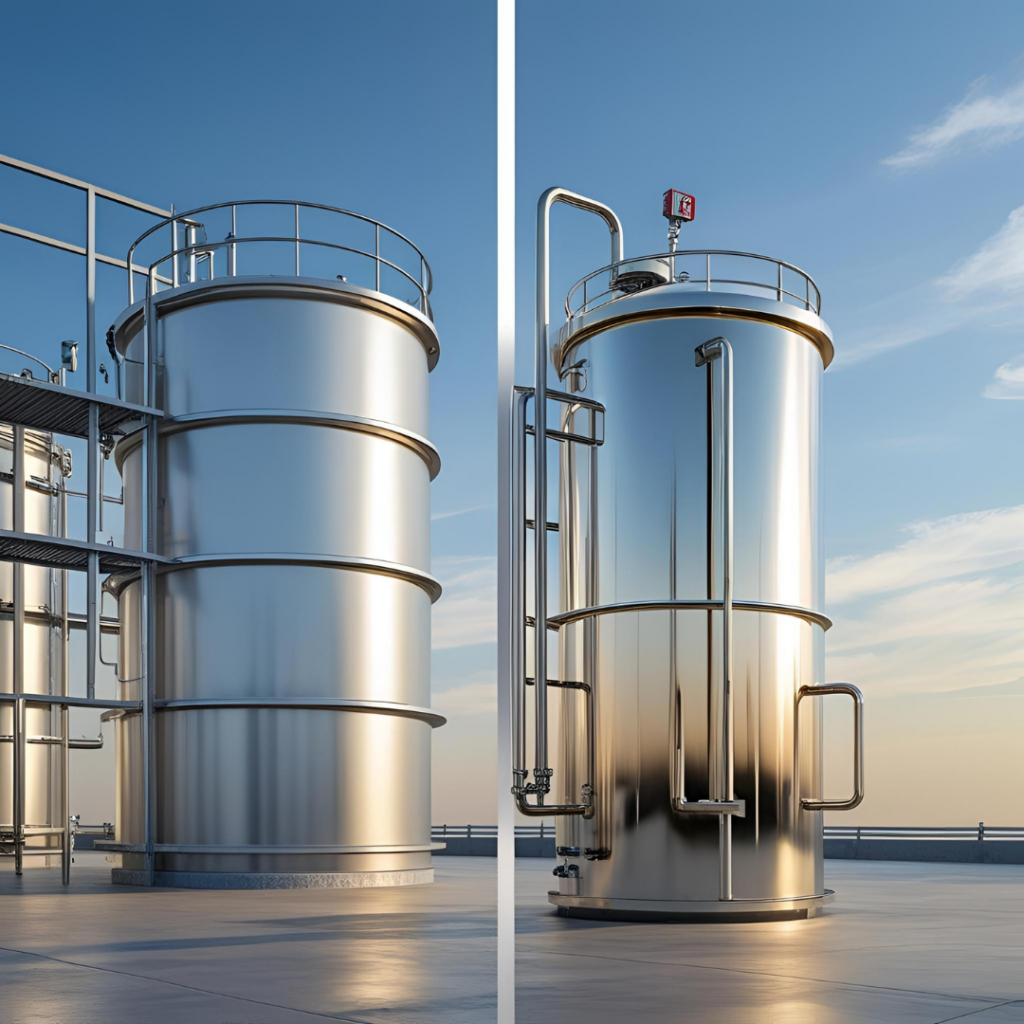The Importance of Fuel Storage
In the world of energy, fuel is still one of the most critical resources. The proper storage of such a valuable and hazardous liquid is of great importance both environmentally and economically. A poorly chosen tank can pollute nature with leaks and cause serious financial damage to your business.
Why is the Right Decision in Tank Selection Vital?
An unsuitable tank is not just a loss of investment; it’s also a safety risk. Therefore, you must choose the most suitable tank type for your business’s needs. This is where the question of “single-walled” or “double-walled” comes to the forefront.
What is a Fuel Storage Tank?
Basic Definition
Fuel storage tanks are industrial products used to safely store diesel, gasoline, and other flammable liquids. These tanks are generally used in above-ground or underground applications.
Areas of Use
Industrial Use
Fuels used as an energy source in factories are stored in these tanks.
Agricultural and Logistical Purposes
They are widely preferred in large-scale fuel consumption areas such as agricultural machinery and truck fleets.
Single-Walled Fuel Storage Tanks
Structural Features
Single-walled tanks are made from a single layer of steel. They are cost-effective due to their simple structure.
Advantages
- Lower cost.
- Easy to install.
- Ideal for short-term use.
Disadvantages
Sealing Issues
The risk of leakage increases due to cracks and rust that may form over time.
Environmental Risks
The leakage of fuel into the external environment can pollute soil and water resources.
Double-Walled Fuel Storage Tanks
What is a Double-Walled Design?
It consists of two nested layers. The inner tank stores the fuel, while the outer wall acts as a second layer of protection against leaks.
Safety and Durability
In the event of a leak in the inner tank, the outer wall prevents this leakage and the system alerts the user with an alarm.
Leak Detection and Insulation
Thanks to the sensors located between the two walls, leaks are detected instantly. This feature prevents environmental disasters.
Why is it More Preferred?
Long life, low maintenance risk, and high safety standards make double-walled tanks the first choice today.
Differences Between Single-Walled and Double-Walled Tanks
Structural Differences
- Single-walled tank: Single-layer steel structure
- Double-walled tank: Two-layered, insulated structure
Safety Comparison
Double-walled tanks significantly reduce the risk of environmental accidents.
Long-Term Cost Analysis
Although it may seem like a high cost initially, double-walled tanks are more economical in the long run as they reduce maintenance and potential accident costs.
Material Selection: Why Stainless Steel?
Advantages of Stainless Steel
- High corrosion resistance
- Heat resistance
Hygienic structure - Aesthetic appearance
Corrosion Resistance
Stainless steel tanks provide maximum resistance to corrosion, especially in humid environments.
Asinoks’s Quality Standards
asinoks.com makes a difference with its use of stainless steel compliant with DIN and ISO standards.
asinoks.com’s Production Capacity and Solutions
Production Process
Precision cutting with CNC machines and high-strength joining techniques with TIG welding are used.
Custom Design Tank Manufacturing
Products are designed entirely to suit your business with custom dimensions, volumes, and connection options.
Field Applications and Installation Services
Asinoks not only manufactures but is also by your side during the installation and commissioning process.
Legal Regulations and Standards for Fuel Tanks
Regulations in Turkey
Production must comply with the regulations set by EMRA and the Ministry of Environment.
CE and ISO Certificates
Asinoks products are CE marked and ISO 9001 certified.
Environmental Impact Reports
Reporting and monitoring solutions are offered for environmentally friendly systems.
Installation and Maintenance Tips
What to Consider During Installation
The tank foundation must be flat, solid, and have a proper drainage system.
The Importance of Periodic Maintenance
Sensor checks, leak tests, and surface inspections should be carried out regularly.
Common Mistakes and How to Avoid Them
Not Choosing the Right Tank
Choosing the wrong tank for short-term savings is detrimental in the long run.
Insufficient Maintenance
Lack of maintenance multiplies the risk of leakage.
Not Complying with Safety Protocols
Dangers such as fire and explosions can occur frequently for this reason.
Future Storage Systems
Smart Sensors and Automation
Leaks can be detected instantly with automatic warning systems.
IoT-Based Monitoring
Remote control and reporting via mobile devices are now possible.
Conclusion and Recommendations
When choosing between single-walled and double-walled fuel storage tanks, it is essential to consider safety, durability, and long-term costs. If you are looking for a solution that will serve your business trouble-free for many years, double-walled tanks made of stainless steel are definitely the right choice. As asinoks.com, we are at your service with custom solutions and top-level quality.
Frequently Asked Questions (FAQ)
- In which situations are single-walled tanks preferred?
They are preferred for short-term and low-budget projects, but safety measures must be taken. - How is a leak detected in double-walled tanks?
Leaks are noticed instantly thanks to the sensor system between the two walls. - How durable are stainless steel tanks?
With proper maintenance, they can be used for up to 30 years. - How often should fuel tanks be maintained?
It is recommended that they be checked by expert teams at least once a year. - What certificates do Asinoks products have?
They have internationally valid quality certificates such as CE and ISO 9001.


